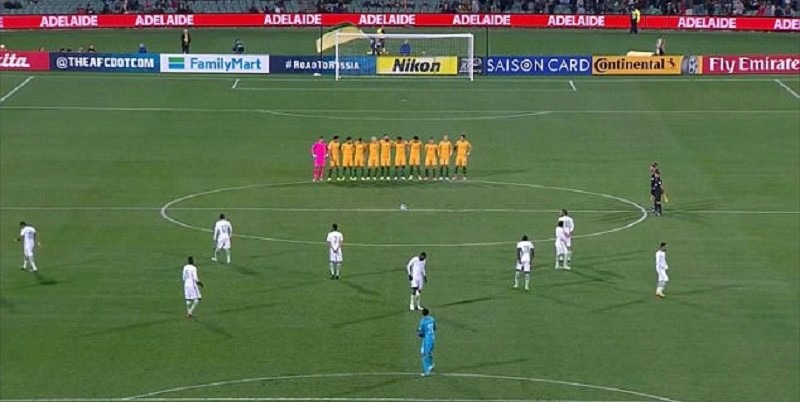You may have heard about the Saudi soccer team that refused to observe a minute of silence for the London terror victims.
And then, again, maybe you haven’t heard about it. The media doesn’t like to report news that puts Islam in a bad light. They’ll report jihad terror attacks, of course, but they’ll do their best to leave out the details that connect the terror to Islam. It typically takes the press forever to fess up that the culprit was a Muslim who shouted “Allahu akbar.”
The Saudi soccer team? It was playing in the World Cup qualifiers in Adelaide against the Australian team. Prior to the start of the game, the announcer called for a moment of silence to commemorate the victims of the London Bridge terror attack, among whom were two Australian women. But the Saudi players ignored the commemoration and simply moved into formation on the field. Meanwhile, the Saudi players on the bench refused to stand for the minute of silence.
As Sheik Mohammad Tawhidi later explained to the press:
In their eyes the attackers are martyrs who are going to paradise. And if they stand for a minute of silence they are against their Muslim brothers who fought for jihad and fought [against] the infidels.
Besides, as the sheik helpfully added, “according to Wahhabi Islam – which governs Saudi Arabia – it is not wrong or a sin for a Muslim to kill a non-Muslim.” So, from a multicultural viewpoint, you can’t blame the Saudi team. You can’t expect them to mourn the death of people who deserve to die.
Having been schooled in the pieties of political correctness, most Westerners will assume that this is a minority viewpoint among Muslims – that the players must have misunderstood their religion. But that’s not entirely the case. One of the most widely consulted manuals of sharia law contains a section describing the penalties for various crimes, including murder. The manual explicitly states that no penalty should be imposed on “a Muslim for killing a non-Muslim.” (Reliance of the Traveller o1.2)
But does anyone outside of Saudi Arabia and Yemen take this 7th-century stuff seriously? Well, apparently they do in parts of England. Take the mosque where Salman Abedi, the Manchester suicide bomber, worshiped. The Didsbury Mosque has hosted several preachers who have called for homosexuals, British soldiers, and non-believers to be killed.
Moreover, Salman’s 18-year-old sister also seems to have picked up the message that it’s okay to kill non-Muslims if your intentions are pure. Jomana Abedi posted on Facebook an Arabic prayer celebrating her brother’s entry into paradise. The translation reads:
[To the righteous it will be said], O reassured soul, return to your Lord, well pleased and pleasing [to Him] and enter among my [righteous servants], and enter My Paradise.
Since Jomana worked at the Didsbury Mosque (as did her father), we can assume that she had more than a passing knowledge of the faith. In fact, there is evidence that those Muslims with a better knowledge of their faith are more accepting of the violence that it commands. For example, a German study involving in-depth interviews with 45,000 respondents found that Islam is the only religion that makes its adherents more prone to violence the more religious they become. According to Christian Pfeiffer who headed the study, “Even when other social factors were taken into account, there remained a significant correlation between religiosity and readiness to use violence.”
A Danish research team found a similar pattern. After analyzing the texts of the ten largest world religions, they concluded:
The texts in Islam are clearly distinct from those of other religions’ text, as they to a much higher degree call for violence against followers of other faiths.
Not all Muslims are so disposed, of course.
One seemingly hopeful sign is that 130 Imams in the UK have refused to perform funeral prayers for the three jihadis who killed seven and wounded dozens on London Bridge and in nearby Borough Market. In addition, they have called for others to do the same. The story made headlines worldwide, and Secretary of State Rex Tillerson, for one, was “encouraged” by the news.
Yes, it sounds encouraging . . . except there’s a catch. As Jihad Watch editor Robert Spencer points out, imams aren’t supposed to say funeral prayers for martyrs. He cites two passages from the Bukhari Hadith collection in which Muhammad not only forbids funeral prayers for martyrs but also forbids the blood to be washed from their bodies. (Bukhari 5. 59. 406; 2. 23. 427) Reliance of the Traveller repeats the injunction: “It is unlawful to wash the body of a martyr or perform the funeral prayer over him.” (g 4. 20)
It seems like a shabby way to treat a martyr until you consider the logic behind the ban. You don’t say funeral prayers for martyrs because they don’t need your prayers: they are already in paradise. You don’t wash the blood off their bodies because their blood is the red badge of their righteousness. Looked at in its proper context, the ban on funeral prayers is actually an inducement to suicide cum slaughter. If you want a guaranteed ticket to paradise with no prayers required, this is the way to go.
Which brings us back to the Saudi soccer team and their refusal to gainsay what the London jihadis did. It seems that the players might not have misunderstood their religion, after all, just as Sheik Tawhidi explained. At first glance, the soccer team and the imams appear to be reading from quite different books, but a closer look reveals that they are on the same page.
This article originally appeared in the June 14, 2017 edition of The Catholic Thing.


